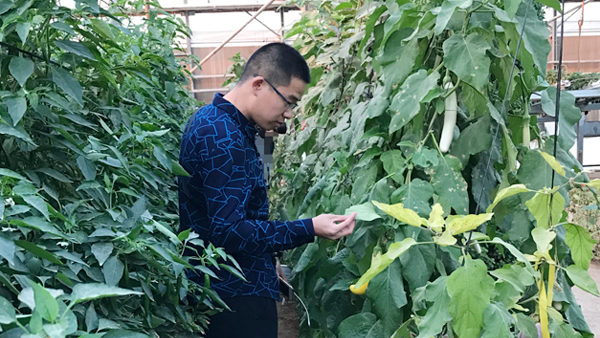The reporter learned that after eight years' unremitting efforts of more than 50 researchers,Tu chef fertilizer industryThe soil enzyme was successfully extracted from the complex microbial flora by the technology of aggregation and inactivation and bioengineering. Dr. Li Xinmin, who is from the fertilizer industry of Tudachu, told reporters that there are four ways for the sources of soil enzymes in nature, namely, the secretion and release of soil enzymes by plant roots, the secretion and release of soil enzymes by microorganisms, the release of soil enzymes by soil fauna and the release of soil enzymes by animal and plant residues. However, the researchers in fertilizer industry of Tudachu successfully extracted the soil enzyme from the compound microbial flora. When this raw material is used in fertilizer production, it can obviously improve the soil fertility and soil fertility, promote rooting, purify the soil, reduce toxicity, control plant diseases and insect pests, etc. Let's follow Dr. Li Xinmin and unlock the mystery of soil enzymes together.

Li Nongqiang, founder of local chef, is in Israel.2Investigation of Migao Pepper Eggplant Garden
Dr. Li Xinmin said that soil enzymes (soil enzyme) is a relatively stable protease, which can be adsorbed on the surface of soil colloid or exist as a complex, and is ubiquitous in fertile soil. It has the functions of improving soil fertility and soil fertility, promoting rooting, purifying soil, reducing toxicity, controlling plant diseases and insect pests, etc. It is an important index to evaluate soil fertility and soil fertility. as far back as1926Year,WaksmanandDubosThe doctor put forward the activity of soil catalase as the index of soil fertility.1952yearHofmannDr. Wang proposed that soil enzyme activity should be used as an index to measure the biological activity and productivity of soil. Soil enzymes are classified into hydrolases (sucrase, maltase, lactase, amylase, arylesterase, phosphatase, cellulase, invertase, urease, etc.), oxidoreductases (dehydrogenase, catalase, peroxidase, nitrite reductase, glucose oxidase, nitrate reductase, etc.) and transferases.(Transglycosidase, fructan sucrase, dextran sucrase, aminotransferase, etc.), lyases(Glutamate dehydrogenase, glutamate decarboxylase, aspartate dehydrogenase, aspartate decarboxylase, aromatic amino acid decarboxylase, etc.).
According to Dr. Li Xinmin, the local chef fertilizer industry can make good use of the living technology and bioengineering technology to live together a variety of beneficial microorganisms, which can not only play a synergistic role among strains, but also improve the synergy among strains. In the preparation of soil enzyme, firstly, the seed culture solution is prepared, and then the first, second and third seed tanks are used for batching, inoculation, cultivation, then fermentation, purification and other twelve processes, finally, high-activity soil enzyme is obtained. This process and technology has the following advantages.
(1) can relieve substrate inhibition, product feedback inhibition and catabolite repression.
(2) can reduce the growth of bacteria and improve the conversion rate of useful products.
(3) The variation of strains and contamination of mixed bacteria are easy to control.
(4) is convenient for automatic control.
After the detailed introduction of Dr. Li Xinmin, the author also summarized the five functions of living soil enzymes:
1Improve soil fertility: Soil enzymes are involved in the transformation of organic matter in the soil, which can crack glycosidic bonds, lipid bonds, peptide bonds, anhydride bonds and other bonds in organic compounds, and hydrolyze polymer compounds into nutrients used by plants and microorganisms.
2Improve soil fertility: soil enzymes can improve the soil respiration intensity, and glucose, the enzymatic product secreted by soil enzymes, is the nutrient source of microorganisms; Ammonia, the product of enzymatic action, is one of the nitrogen nutrition sources of plants. Enzymatic product available phosphorus is one of the nutrient sources of plant phosphorus. Soil enzymes can also promote the transformation of soil organic matter, and directly affect the decomposition, transformation and synthesis of soil organic matter.
3Promoting rooting: Soil enzymes can release active rooting enzymes, stimulate root tip growth, and make crops have more white roots, longer roots and stronger roots.
4Purify the soil and reduce the toxicity: There are a lot of harmful substances in the soil, and the enzymatic products secreted by soil enzymes can purify the soil, reduce the toxicity and provide a good growing environment for crops. The soil with high enzyme content has strong plants and fewer diseases.
5Prevention and control of plant diseases and insect pests: Soil enzymes in soil include chitinase, pectinase, glucanase, protease, lipase and other enzymes. They can achieve the purpose of prevention and control by hydrolyzing the cell materials of pathogenic microorganisms or pests and destroying their cell structures.
I believe that the large-scale popularization and application of aggregated and super-active soil enzymes in fertilizers will improve the soil fertility and fertility, and bring new breakthroughs to improve the yield and quality of crops, hoping for more.Fertilizer manufacturerMake positive contributions to modern Chinese agriculture.
Shandong Tudachu Fertilizer Co., Ltd. is a high-tech enterprise introduced by the government, which integrates the research and development, production, sales, foreign technology introduction and import agency of microbial agents, water-soluble fertilizers and fully water-soluble tower compound fertilizers. It is supported by a full set of functional fertilizer products, scientifically nourishes every cycle of crop growth, and provides a variety of high-tech products. According to the different conditions of different crops, nutrition cares for every link of crop growth, effectively solves the problem of crop nutrient deficiency, and enables crops to grow healthily and obtain higher quality and more output.